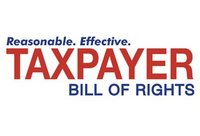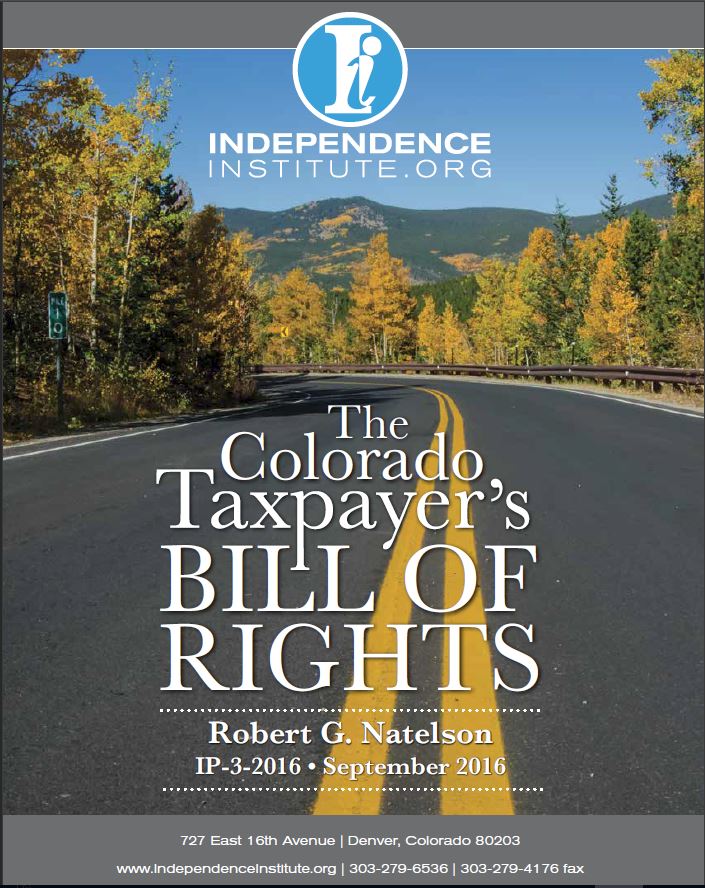Freedom Minute | Everything You Ever Wanted to Know about TABOR
Why Politicians Oppose TABOR
The Colorado Taxpayer’s Bill Of Rights Booklet
Douglas Bruce’s response to Rural Republicans tell lawmakers it’s time for action on Hospital Provider Fee
Let’s apply ten conservative political principles to this hospital provider fee situation.
- 1. Limiting growth of state government requires setting state spending priorities.
- 2. Allowing any business to fail that has insufficient market demand is called the free market. Government intervention violates the meaning of a free market.
- 3. What does the most good for the most people–propping up failing businesses or providing broad benefits of limited government services equally to everyone?
- 4. Who was forced to live in remote rural areas with fewer services? (No one.)
Rural Republicans tell lawmakers it’s time for action on Hospital Provider Fee
Dire funding news for the state’s hospitals has left Republicans in rural Colorado pleading with the legislature to restructure the Hospital Provider Fee, despite ideological beliefs.
It is a thorny issue that pits conservatives in the legislature against fellow Republicans in rural parts of the state.
Hospitals face a $264 million reduction in the upcoming budget that begins in July. That number is up from an initial budget request in November, which proposed a $195-million reduction. Rural hospitals are expected to receive the worst of it, with expectations for some hospitals to close.
Budget writers have proposed a $28.3 billion annual spending plan that lawmakers will begin to debate this week. In an effort to pass a balanced budget, the Joint Budget Committee proposed reducing collections of the Hospital Provider Fee.
Changes to TABOR will hurt state taxpayers
Changes to TABOR will hurt state taxpayers
A Republican-sponsored bill in the Colorado legislature would likely let state government keep more of your tax money whether it needs it or not.
 In 2005, Referendum C suspended Colorado’s constitutional limit on the amount of tax revenues that the state could keep. Called the “TABOR timeout,” the Referendum allowed the state to reset the limit on state revenue collection at the highest amount of annual revenue received between June FY 2005-6 and FY 2009-10. Referendum C was a permanent tax increase, which has increased Colorado state spending by an estimated $2.6 billion over the last decade. At present, only 38 percent of state spending remains subject to TABOR.
In 2005, Referendum C suspended Colorado’s constitutional limit on the amount of tax revenues that the state could keep. Called the “TABOR timeout,” the Referendum allowed the state to reset the limit on state revenue collection at the highest amount of annual revenue received between June FY 2005-6 and FY 2009-10. Referendum C was a permanent tax increase, which has increased Colorado state spending by an estimated $2.6 billion over the last decade. At present, only 38 percent of state spending remains subject to TABOR.
Now the tax and spend coalition wants more.
Some state officials are understandably delighted by any measure that relieves them of the drudgery of running the state on a tight budget. It is much less taxing to be a state legislator when revenues are rising than when they are falling. When spending must be cut, difficult choices are required. No one is happy.
Lower Taxes + Less Government = More Freedom
Shot at Bruce?
Shot at Bruce?
But what is the purpose of the paragraph saying that ?“TABOR was passed in 1992 on its third try by Colorado tax rebel Doug Bruce” who has owned “run-down Pueblo properties in the past”?
Is it to show that in 1990 and 1991, legislators told voters, “Hey trust us; you voters don’t need TABOR to protect yourselves from tax increases,” and that voters believed twice — but not three times?
Is it to show that Bruce is really a Pueblo guy at heart because he, too, has owned run-down property in Pueblo, a city with a website dedicated to run-down property, a city with a newspaper that rightly criticizes run-down property, but a city with a municipal government that can’t seem to protect its citizens from the scourge of run-down property, and that such a state of affairs could lead taxpayers to rebel and to deny tax increases?
Is it to show that if you get lucky, the guy owning run-down property on your street might save his fellow citizens $3 billion?
Which brings us to the editorial in the same issue of The Chieftain. The editorial complains that the city government wants more money, but they don’t want to ask for it, as the law requires; they want to simply take it by calling a tax a fee.
I hope The Chieftain appreciates the irony. It is this disassembling by elected officials that is causing this discussion to occur and voters to rebel, but without the voter rebellion and approval of the TABOR law, your editorial would be a blank page — no discussion of taxes or of fees.
Mark Clinard
Florence
Dave Wallace: Ballot measure 1A

Friday, March 10, 2017
To the editor:
Reading through the mailing I received that was also sent out to all registered voters referring to Measure 1A it becomes very obvious the City believes it desperately needs additional funding which will be the outcome if 1A passes. I am in agreement that it probably is necessary providing the information presented to the public in this “Notice of Election” and along with the mailing that accompanied this month’s utility billing is in fact correct.
I do find myself somewhat troubled over several issues, I have yet to see a commitment from the city that during these times of economic struggle they assure the public their business will be run as efficiently as possible and they will focus on conducting business off of a priority list rather than the wish list.




